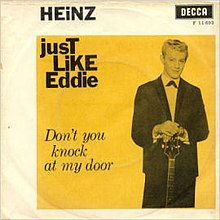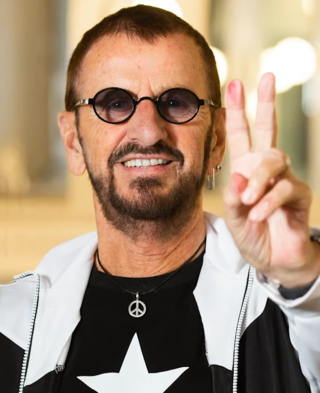
Sir Richard Starkey, known professionally as Ringo Starr, is an English musician, songwriter and actor who achieved international fame as the drummer for the Beatles. Starr occasionally sang lead vocals with the group, usually for one song on each album, including "Yellow Submarine" and "With a Little Help from My Friends". He also wrote and sang the Beatles songs "Don't Pass Me By" and "Octopus's Garden", and is credited as a co-writer of four others.
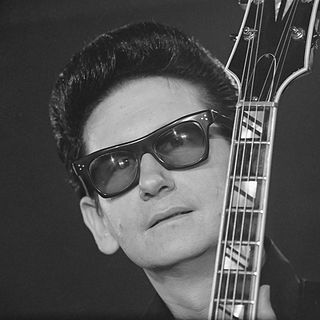
Roy Kelton Orbison was an American singer, songwriter, and musician known for his impassioned singing style, complex song structures, and dark, emotional ballads. His music was described by critics as operatic, earning him the nicknames "The Caruso of Rock" and "The Big O". Many of Orbison's songs conveyed vulnerability at a time when most male rock-and-roll performers chose to project machismo. He performed while standing motionless and wearing black clothes to match his dyed black hair and dark sunglasses.

Ray Edward Cochran was an American rock and roll musician. Cochran's songs, such as "Twenty Flight Rock", "Summertime Blues", "C'mon Everybody" and "Somethin' Else", captured teenage frustration and desire in the mid-1950s and early 1960s. He experimented with multitrack recording, distortion techniques, and overdubbing even on his earliest singles. Cochran played the guitar, piano, bass, and drums. His image as a sharply dressed and attractive young man with a rebellious attitude epitomized the stance of the 1950s rocker, and in death he achieved iconic status.
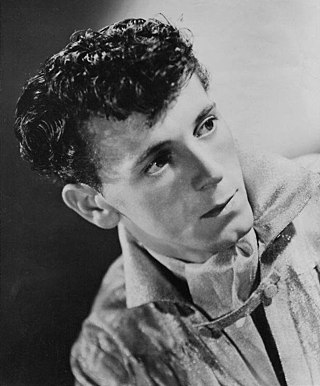
Vincent Eugene Craddock, known as Gene Vincent, was an American musician who pioneered the styles of rockabilly and rock and roll. His 1956 top ten hit with his backing band the Blue Caps, "Be-Bop-a-Lula", is considered a significant early example of rockabilly. His chart career was brief, especially in his home country of the US, where he notched three top 40 hits in 1956 and 1957, and never charted in the top 100 again. In the UK, he was a somewhat bigger star, racking up eight top 40 hits from 1956 to 1961.

Robert George "Joe" Meek was an English record producer, sound engineer and songwriter who pioneered space age and experimental pop music. He also assisted in the development of recording practices like overdubbing, sampling and reverberation. Meek is considered one of the most influential sound engineers of all time, being one of the first to develop ideas such as the recording studio as an instrument, and becoming one of the first producers to be recognised for his individual identity as an artist.
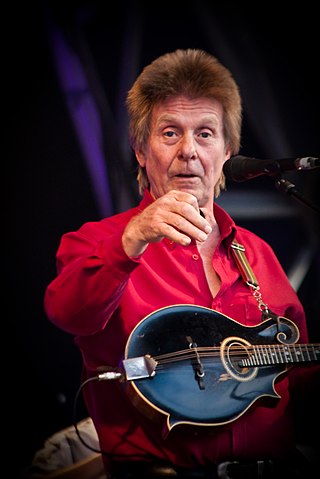
Joseph Roger Brown, MBE is an English musician. As a rock and roll singer and guitarist, he has performed for more than six decades. He was a stage and television performer in the late 1950s and has primarily been a recording star since the early 1960s. He has made six films, presented specialist radio series for BBC Radio 2, appeared on the West End stage alongside Dame Anna Neagle and has written an autobiography. In recent years he has again concentrated on recording and performing music, playing two tours of around 100 shows every year and releasing an album almost every year.
The Tornados were an English instrumental rock group of the 1960s that acted as backing group for many of record producer Joe Meek's productions and also for singer Billy Fury. They enjoyed several chart hits in their own right, including the UK and US no. 1 "Telstar", the first US no. 1 single by a British group.

Ronald Wycherley, better known by his stage name Billy Fury, was an English musician. An early star of rock and roll, he equalled the Beatles' record of 24 hits in the 1960s and spent 332 weeks on the UK chart. His hit singles include "Wondrous Place", "Halfway to Paradise" and "Jealousy". Fury also maintained a film career, notably playing rock performers in Play It Cool in 1962 and That'll Be the Day in 1973.

"Summertime Blues" is a song co-written and recorded by American rock artist Eddie Cochran. It was written by Cochran and his manager Jerry Capehart. Originally a single B-side, it was released in August 1958 and peaked at number 8 on the Billboard Hot 100 on September 29, 1958, and number 18 on the UK Singles Chart. It has been covered by many artists, including being a number-one hit for country music artist Alan Jackson, and scoring notable hits in versions by Blue Cheer, the Who and Brian Setzer, the last of whom recorded his version for the 1987 film La Bamba, in which he portrayed Cochran. Jimi Hendrix performed it in concert. T. Rex recorded their own rendition of the song for their self-titled debut album T. Rex in 1970 and performed it live.
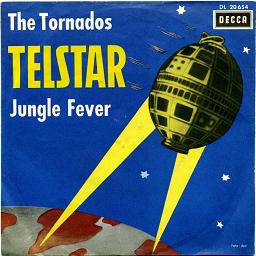
"Telstar" is a 1962 instrumental by the English band the Tornados, written and produced by Joe Meek. It reached number one on the UK Singles Chart and the US Billboard Hot 100 in December 1962. It was the second instrumental single to hit number one in 1962 on both the US and UK weekly charts.

Mike Berry is a British singer and actor. He is known for his top ten hits "Don't You Think It's Time" (1963) and "The Sunshine of Your Smile" (1980) in a singing career spanning nearly 60 years. He became an actor in the 1970s, and was best known for his appearances as Mr. Spooner on the British sitcom Are You Being Served? in the early 1980s.

"Only the Lonely (Know the Way I Feel)" is a 1960 song written by Roy Orbison and Joe Melson. Orbison's recording of the song, produced by Fred Foster for Monument Records, was the first major hit for the singer. It was described by The New York Times as expressing "a clenched, driven urgency". Released as a 45 rpm single by Monument Records in May 1960, "Only the Lonely" went to No. 2 on the United States Billboard pop music charts on 25 July 1960 (blocked by Brenda Lee's "I'm Sorry") and No. 14 on the Billboard R&B charts. "Only the Lonely" reached number one in the United Kingdom, a position it achieved on 20 October 1960, staying there for two weeks (out of a total of 24 weeks spent on the UK singles chart from 28 July 1960). According to The Authorized Roy Orbison, "Only the Lonely" was the longest charting single of Orbison's career. Personnel on the original recording included Orbison's drummer Larry Parks, plus Nashville's regulars, Floyd Cramer on piano, Bob Moore on bass, and Hank Garland and Harold Bradley on guitars, Joe Melson and the Anita Kerr Singers on backing vocals. Drummer Buddy Harman played on the rest of the songs on the session.
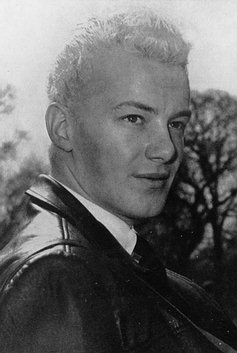
Heinz Burt was a German-born British rock and roll bassist and singer who performed under the stage name Heinz. He was also known as a member of the instrumental group the Tornados.
Geoffrey Goddard was an English songwriter, singer and instrumentalist. Working for Joe Meek in the early 1960s, he wrote songs for Heinz, Mike Berry, Gerry Temple, The Tornados, Kenny Hollywood, The Outlaws, Freddie Starr, Screaming Lord Sutch, The Ramblers and John Leyton. His song for Leyton, "Johnny Remember Me", reached number 1 in the UK Singles Chart.

Jess Conrad is an English stage and screen actor and singer. As a boy he was nicknamed "Jesse" after American outlaw Jesse James; as there was already an actor named "Gerald James" in Actors' Equity, a drama teacher who was a fan of writer Joseph Conrad suggested the stage name of "Jess Conrad".
David Malcolm Adams was a British singer, keyboard player and songwriter.
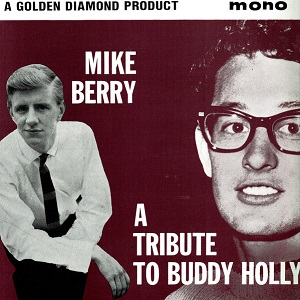
"Tribute to Buddy Holly" is a song written by Geoff Goddard, first recorded by Mike Berry and the Outlaws as a single, which was released in September 1961 on His Master's Voice records. His first chart success, it reached number 24 on the UK Singles Chart in November 1961. The song was banned by the BBC for being too "morbid", regarding the death of 1950s rock and roll singer Buddy Holly, who died in a plane crash on 3 February 1959.

Vince Eager is an English pop musician. He was widely promoted by impresario Larry Parnes, but later quarrelled with him over his commercialising of Eddie Cochran's tragic early death. Eager has since appeared in cabaret and on the West End stage.

David John Harman, known professionally as Dave Dee, was an English singer-songwriter, musician, A&R manager, fundraiser and businessman. He was the frontman for the 1960s pop band Dave Dee, Dozy, Beaky, Mick & Tich.
